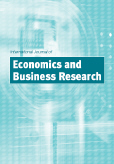Forthcoming Articles
International Journal of Economics and Business Research

Forthcoming articles have been peer-reviewed and accepted for publication but are pending final changes, are not yet published and may not appear here in their final order of publication until they are assigned to issues. Therefore, the content conforms to our standards but the presentation (e.g. typesetting and proof-reading) is not necessarily up to the Inderscience standard. Additionally, titles, authors, abstracts and keywords may change before publication. Articles will not be published until the final proofs are validated by their authors.
Forthcoming articles must be purchased for the purposes of research, teaching and private study only. These articles can be cited using the expression "in press". For example: Smith, J. (in press). Article Title. Journal Title.
 Articles marked with this shopping trolley icon are available for purchase - click on the icon to send an email request to purchase.
Articles marked with this shopping trolley icon are available for purchase - click on the icon to send an email request to purchase.
Online First articles are also listed here. Online First articles are fully citeable, complete with a DOI. They can be cited, read, and downloaded. Online First articles are published as Open Access (OA) articles to make the latest research available as early as possible.
Register for our alerting service, which notifies you by email when new issues are published online.
International Journal of Economics and Business Research (4 papers in press) Regular Issues
Abstract: This study examines the effects of Türkiye's export strategies on economic growth in the globalising world economy and the role of human capital in this process. The relationship between human capital, exports, imports, fixed capital investments and economic growth in Türkiye is analysed for the period 1960-2023 based on the endogenous growth model. The aim of this study is to empirically examine the causality relationship between exports and human capital in Türkiye within the framework of the endogenous growth model. The results obtained from the cointegration analysis and causality tests applied in the study are consistent with the assumptions of endogenous growth theories in Türkiye. The study reveals that exports, imports, human and fixed capital are important elements of economic growth. Keywords: human capital; export; economic growth; endogenous growth; fixed capital investments; Türkiye. DOI: 10.1504/IJEBR.2026.10076363
Abstract: This study examines how digital transformation (DT) enhances competitive advantage (CA) in Guangdong's retail sector, with supply chain dynamic capabilities (SCDC) as a mediator and channel integration as a moderator. Analysis of 429 survey responses using structural equation modelling reveals that DT directly improves both SCDC and CA. The three-dimensional SCDC construct partially mediates this relationship. Furthermore, strong channel integration amplifies DT's positive effect on CA. The findings integrate dynamic capability theory into retail supply chain management, offering practical insights for firms. Keywords: digital transformation; competitive advantage; supply chain dynamic capabilities; channel integration; retailing. DOI: 10.1504/IJEBR.2026.10076410
Abstract: This study examined the performance impact of strategic partnerships (SP) and enterprise supplier development (ESD) within South Africa's clothing manufacturing sector. It explored how procurement-driven mechanisms contribute to firm competitiveness, efficiency, and inclusive industrial growth. Structural equation modelling was applied to analyse responses from 621 clothing manufacturers operating in three provinces of South Africa. The findings revealed that both SP and ESD exert statistically significant positive effects on firm performance, particularly in enhancing cost efficiency, reducing lead times, and improving product quality. SP fosters innovation and relational stability, while ESD strengthens supplier capacity, infrastructure readiness, and compliance. However, persistent barriers such as financial exclusion, policy misalignment, and global sourcing pressures continue to constrain local industrial revitalisation. The findings inform procurement and industrial policy by demonstrating how institutionalising SP and ESD within buyer-supplier relationships can drive performance and support national development goals. This research offers a validated framework for leveraging relational procurement to foster competitiveness, local supplier upgrading, and INCLUSIVE economic transformation. Keywords: strategic partnerships; SP; enterprise supplier development; ESD; procurement; performance; clothing manufacturing; South Africa. DOI: 10.1504/IJEBR.2026.10076302
Abstract: This study examines the impact of board gender diversity and audit committee members' accounting expertise on forward-looking information disclosure (FLID) within the agency theory framework. Using panel data from 201 firms listed on the Indonesia Stock Exchange across six strategic sectors from 2020-2024, a quantitative approach with robust panel regression is applied. The findings reveal that board gender diversity has a significant but negative effect on FLID, suggesting that gender-diverse boards influence disclosure through conservative monitoring rather than increased disclosure volume. Conversely, accounting expertise of audit committee members shows no significant effect, implying that such expertise enhances reporting quality without affecting discretionary disclosure. Control variables, including board size, firm size, leverage, firm age, and year effects, significantly influence disclosure behaviour. Overall, the study demonstrates that internal governance mechanisms may discipline rather than expand disclosure in emerging markets, highlighting contextual governance effects and offering implications for regulators and policymakers. Keywords: forward-looking information disclosure; board gender diversity; audit committee expertise; corporate governance; emerging markets. DOI: 10.1504/IJEBR.2026.10076403 |
 Open Access
Open Access
